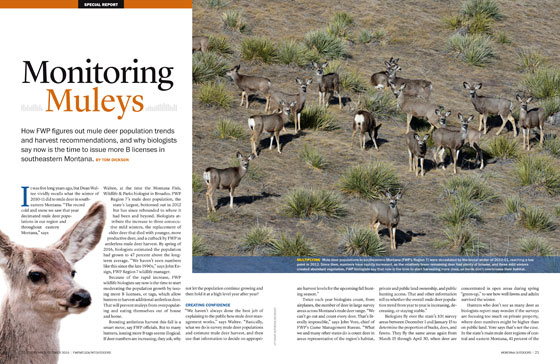MONTANA OUTDOORS
Monitoring Muleys
How FWP figures out mule deer population trends and harvest recommendations, and why biologists say now is the time to issue more B licenses in southeastern Montana.


Sign up to receive email or text notifications about important hunting and fishing news and announcements.
Regulations for upcoming seasons are posted online throughout the year. Deer, elk and antelope regulations are typically posted late February.
Launch maps, obtain legal descriptions, regulations, and statistics all in one place.
These dates are provided only as a general reference. Check current regulations or use FWP's online Hunt Planner for specific dates.
Archery: Sept. 5 - Oct. 18
Youth, deer only: Oct. 15 - Oct. 16
General: Oct. 24 - Nov. 29
Shoulder seasons: Aug. 15 - Feb. 15, varying dates before and/or after the archery and general seasons
Muzzleloader: Dec. 12 - 20
Backcountry - HD's 150, 280, 316*
General: Sept. 15 - Nov. 29
*HD 316 does not have an Archery-only Season
Details: License is valid for one deer. Hunters may hold only one general deer license, which can be used for deer as indicated under the “General Deer License” heading on the deer and elk hunting regulations. Montana residents 17 and under, holders of a disabled resident conservation license, or residents 62 years and older may purchase this license for $8.
Fees:
Resident: $16
Nonresident: N/A
Details: The B License is an antlerless deer license valid during a specific time period and in a particular hunting district or group of districts. Applicants are required to pay full license fee. Cost includes $5 nonrefundable application fee.
Fees:
Resident: $15
Nonresident: $80
Details: The B License is an antlerless deer license valid during a specific time period and in a particular hunting district or group of districts.
Fees:
Resident: $10
Nonresident: $75
Details: Allows hunting of antlerless white-tailed deer only, in one region only. Hunter must designate region upon purchase. Not available for all regions.
Fees:
Resident: $10
Nonresident: $75
Details: Nonresidents may apply for only one combination license per year. Includes a General Deer license and authorizes fishing and hunting of upland game birds, excluding turkey. Conservation with State Lands, Base Hunting and Aquatic Invasive Species Prevention Pass (AISPP) must be purchased separately. 4,600 licenses available.
Fees:
Resident: N/A
Nonresident: $704
Details: Nonresidents may apply for only one combination license per year. Includes a General Deer license and authorizes fishing and hunting of upland game birds, excluding turkey. Conservation with State Lands, Base Hunting and Aquatic Invasive Species Prevention Pass (AISPP) must be purchased separately. Landowner certificates are obtained from your landowner sponsor. To be certified as a landowner sponsor, contact (406) 444-2950. 2,000 licenses available.
Fees:
Resident: N/A
Nonresident: $704
Details: The permit must be used with a general deer hunting license. A permit is not a second license and does not allow the holder to kill an additional animal. Rather, it expands the opportunity to hunt for a species in a particular hunting district allowing the hunter in some hunting districts to harvest a Buck Mule Deer. General Deer license is available to nonresidents only through the Deer or Big Game Combination licenses. Residents must hold a valid general deer license to apply. Nonresidents must also apply for a big game or deer combination license to apply.
Fees:
Resident: $5
Nonresident: $5
Details: For former resident who was born in Montana with current resident relative, other qualifications apply. Conservation with State Lands, Base Hunting and Aquatic Invasive Species Prevention Pass (AISPP) must be purchased separately. Learn more about Nonresident Licenses.
Fees:
Resident: N/A
Nonresident: $604
Details: For former resident with current resident relative who was born in Montana, other qualifications apply. Conservation with State Lands, Base Hunting and AISPP must be purchased separately. Learn more about Nonresident Licenses.
Fees:
Resident: N/A
Nonresident: $352
Details: To qualify you must have previously hunted in Montana as a resident or hold a Montana hunter education certificate. This license requires a sponsor who is a Montana resident family member, including direct In-laws, who also holds a current years resident hunting license. Includes General Deer and Elk, Upland Game Bird, and Fishing license. Conservation with State Lands, Base Hunting and AISPP must be purchased separately. A total of 500 are available. Learn more about Nonresident Licenses.
Fees:
Resident: N/A
Nonresident: $604
Details: To qualify you must have previously hunted in Montana as a resident or hold a Montana hunter education certificate. This license requires a sponsor who is a Montana resident family member, including direct In-laws, who also holds a current years resident hunting license. Includes General Deer, Upland Game Bird, and Fishing license. Conservation with State Lands, Base Hunting and AISPP must be purchased separately. A total of 500 are available. Learn more about Nonresident Licenses.
Fees:
Resident: N/A
Nonresident: $352
Details: If you are a nonresident college student currently carrying 12 credits or more at a Montana college or university, you can fish and hunt deer, elk and upland game birds (this includes the AIS Prevention Pass and Base Hunting License). Students must provide at the time of purchase:
Current enrollment verification form
Valid student identification
Proof of completing hunter education in Montana or elsewhere.
Fees:
Availability
Residents can purchase over the counter. Most nonresidents cannot purchase over the counter; to get a General Deer License, nonresidents must draw of one of the following licenses via random lottery drawing: Big Game Combination License, Deer Combination License or Landowner Sponsored License.
Availability
This license is available via Special Drawing.
Deadline
June 1
Availability
This license is available Over the Counter.
Availability
This license is available Over the Counter.
Availability
This license is available via Special Drawing.
Deadline
April 1
Availability
This license is available via Special Drawing.
Deadline
April 1
Availability
This permit is available via Special Drawing.
Deadline
April 1
Availability
This license is available Over the Counter at FWP Offices only.
Availability
This license is available Over the Counter at FWP Offices only.
Availability
This license is available via Special Drawing.
Deadline
April 1
Availability
This license is available via Special Drawing.
Deadline
April 1
Deer build a new layer called cementum on their teeth each year, much like the annual rings of a tree. By freezing a tooth, a biologist can slice off a thin layer and determine the exact age of the deer. Hunters can estimate the age of deer they take by evaluating replacement and wear of teeth on the lower jaw. Both mule deer and whitetails can be aged by this method.
To check replacement and wear, you will need to slit the check bone to expose the teeth on the lower jaw.
Fawns have an incomplete set of teeth with three premolars and one molar on each side of the lower jaw.
A yearling (1.5 years old in the fall) will have three badly worn premolars. These are temporary teeth and will be replaced next summer. The third premolar which has three crowns is also characteristic of a yearling. When replaced, this tooth will have only two crowns.
The 2.5 year old deer has a full set of permanent teeth. These are characterized by clean, unstained new premolars and molars with sharp, pointed crowns showing little wear.
A mature deer has 20 teeth in its lower jaw. There are eight incisors, six premolars, and six molars. From here on the age of your deer is determined by the relative amount of wear on the teeth. A mature deer (3-7 years old) has teeth that are still in good condition, showing wear, but some still have pointed crowns. In the mature old class (8 years or older) the teeth will be worn almost flat, sometimes nearly to the gums.
To view annual harvest reports and more information, click here.
Deer are managed as a big game species in Montana.
Monitoring Muleys
How FWP figures out mule deer population trends and harvest recommendations, and why biologists say now is the time to issue more B licenses in southeastern Montana.

Have you set up your MyFWP account?

